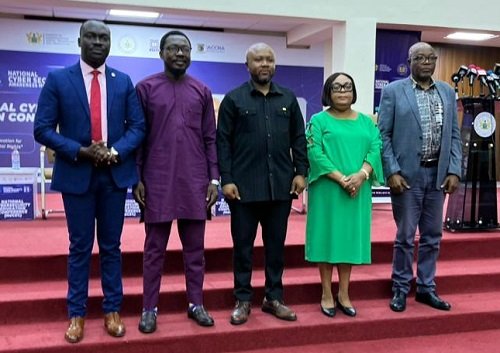News
Make medication, treatment of mental illness free — Lions Club

The President of the Tema Supreme International Lions Club, Mr Allan Doegah, has appealed to the government to make the treatment and medication of mental diseases free.
That, he said, would ensure that many of the people suffering from mental illness, roaming on the streets, would be cured and be reunited with their families.
Mr Doegah also appealed to families to pay particular attention to relatives with mental disorders by providing them with the needed medication.
He made the appeal in Ho when teams of the club from Tema, Accra and the Volta Region fed people with mental illness on the streets of Ho to mark the club’s International Mental Health Day.
Mr Doegah said the experience the team had in Ho showed that the situation of some of the mentally sick persons were not too bad, and could be cured if families provided them with regular medical care.
According to him, the group again encountered another interesting development when one of the mentally sick persons was able to identify one of the team members after receiving his breakfast and shouted, “you, you,” pointing at one of the team members, “I know you,” and mentioned his name — which Mr Doegah said buttressed his early assertion that some of them could be cured.
Mr Doegah and the team later presented 165 high visibility vests to the Volta Regional Motor Transport and Traffic Department (MTTD) at the total cost of GH₵40,000.00 to improve police visibility on the roads at night.
He said the gesture formed part of contributions from the International Lions Club through individual members to support the police MTTD to deliver their mandate effectively on roads in the region.
The Deputy Volta Regional Police Commander, Deputy Commissioner of Police (DCOP) Mr Joseph Owusu Ansah, who received the items, thanked the International Lions Club members for the gesture, saying people did not want to support and associate with the police and support them.
Mr Ansah said the police was mandated to ensure total security and did not engage in any income generating activities, therefore cherished individuals, groups and organisations that support and promote their activities.
From Samuel Agbewode, Ho
Join our WhatsApp Channel now!
https://whatsapp.com/channel/0029VbBElzjInlqHhl1aTU27

News
It Couldn’t Be a Mistake — NSS Deputy DG Questions Intent Behind Ghost Names Fraud

The Deputy Director-General of Operations at the National Service Authority (NSA), Major Moses Dok Nach Kpengu, believes the recent ghost names scandal that led to the loss of millions of cedis from the Authority’s coffers could not have been a mere mistake.
Speaking to the media, Major Kpengu revealed that the irregularities were either the result of a failed system or the deliberate actions of individuals who intended to siphon public funds.
“The system failed us, or it could be that people were intentional about causing financial irregularities. If the system did not fail us, how did ghost names enter the system and allow people to siphon millions of cedis?” he quizzed.
He noted that although he was not in office when the incident occurred, the available data suggests that the fraud could have been prevented if the system had been properly monitored.
According to him, “It baffles my mind that when you have 100,000 registered names uploaded into the system and later validate more than 100,000, you don’t flag it. If you go ahead to pay salaries for 120,000 when only 100,000 were registered, it means someone knew about it. Otherwise, why would you pay the extra 20,000?”
Major Kpengu explained that such a situation could only point to two possibilities — a major system failure or intentional wrongdoing by some individuals within the service.
He further disclosed that the Attorney General’s Department is currently handling the matter, and the National Service Authority has introduced new measures and internal controls to prevent similar irregularities in the future.
“We have put in place certain structures to make sure this kind of thing does not happen again,” he assured.
The ghost names scandal at the National Service Secretariat has raised serious concerns about accountability and transparency in the management of public funds.
The government, through the relevant authorities, is currently investigating the incident as part of broader efforts to strengthen systems and restore public confidence in state institutions.
— By Jacob Aggrey
News
CSA marks Cyber Security Awareness Month with maiden National Cybersecurity Education Conference in Accra

The Cyber Security Authority (CSA) has held the maiden National Cybersecurity Education Conference in Accra to promote cyber resilience and digital rights in Ghana’s education sector.
The conference, organised at the Ghana Tertiary Education Commission (GTEC) auditorium, formed part of activities to mark this year’s National Cyber Security Awareness Month, under the theme “Empowering Higher Education for Cyber Resilience and Digital Rights.”
Speaking at the event, the Acting Director-General of the CSA, Mr. Divine Selase Agbeti, said the theme reflects a shared national commitment by the Authority, the Ministry of Education, GTEC, and all tertiary institutions to build a secure and responsible digital future.
He explained that cybercrime is projected to reach $10.5 trillion globally by the end of 2025, making it one of the biggest economic threats in history. Meanwhile, there remains a shortfall of about four million cybersecurity professionals worldwide.
Mr. Agbeti said Ghana’s rapid digitalisation, where nearly 70 percent of the population relies on the internet for education, governance, and commerce has also increased exposure to cyber risks.
He noted that tertiary institutions have faced cyber incidents such as grade alteration, forged certificates, exam leakages, sextortion, and admission scams, which threaten student welfare and institutional credibility.
He revealed that the education sector has been designated as critical information infrastructure, and protecting it is essential to national security and development.
For that reason, he revealed that the CSA has prioritised education within Ghana’s National Cyber Resilience Strategy, guided by the Cybersecurity Act, 2020 (Act 1038) and the National Cybersecurity Policy and Strategy.
According to Mr. Agbeti, the CSA is working with GTEC and the Ministry of Education to integrate cybersecurity into teaching, learning, and institutional management.
“A draft Memorandum of Understanding (MoU) has been submitted to GTEC to formalise the development of a National Cybersecurity Competency and Qualification Framework, which will create a clear learning path from basic cyber literacy to advanced professional certification” he added.
He further announced that the Authority is collaborating with the Ministry of Education to establish an Education Sectoral Computer Emergency Response Team (EDU-SCERT) to coordinate responses to cyber incidents across universities and colleges.
Mr. Agbeti added that the CSA has reached over 5.6 million adults with cybersecurity awareness programmes between January and October 2025, compared to only 102,000 people reached in 2022, a sign of growing national awareness.
“Cybersecurity can no longer be limited to IT departments or computer labs. Every student, whether studying medicine, law, or business, should have basic knowledge of digital safety and responsibility,” he emphasised.
He commended GTEC, the Ministry of Education, and the Accra Technical University for partnering to organise the event, calling for the conference to become an annual platform for dialogue between academia, industry, and policymakers.
Delivering a keynote address on behalf of the Minister for Education, the Executive Director of CENDLOS, Prof. Diyawu Mumin, said the education sector faces an average of 2,507 cyberattacks weekly globally, making it one of the most targeted sectors worldwide.
He disclosed that between January and October 2025, Ghana’s National Cyber Security Emergency Response Team identified 505 leaked employee credentials and over 5,000 stealer logs belonging to educational institutions, many of which were available for sale on the dark web.
Prof. Mumin said the Ministry recognises that effective policy is the first line of defence in protecting the education system.
He mentioned that the Ministry, in collaboration with the CSA, GTEC, and other stakeholders, has reviewed Ghana’s ICT in Education Policy and EdTech Strategy to embed cybersecurity and digital safety across all levels of learning.
He encouraged GTEC to expedite the signing of the MoU with the CSA to start implementing the cybersecurity competency framework, adding that cybersecurity should be a general course across all disciplines, not just in IT.
“Our vision is for every student, regardless of discipline, to graduate with a grounding in cybersecurity and digital ethics. Universities must treat cybersecurity as a matter of governance and national security, not merely a technical subject,” he stated.
Prof. Mumin also confirmed that the Ministry is working with the CSA to establish an Education Sector Computer Emergency Response Team, which will detect, coordinate, and respond to cyber incidents in the education ecosystem.
He called for urgent action against admission scams, sextortion, cyberbullying, and certificate forgery, which he said threaten trust in Ghana’s educational institutions.
The Director-General of the Ghana Tertiary Education Commission (GTEC), Prof. Ahmed Jinapor Abdulai, in his remarks, said safeguarding Ghana’s digital future must begin from the classroom, the laboratory, and the lecture hall.
He described the theme as visionary and relevant, noting that while digital transformation has improved teaching and research, it has also exposed institutions to cyber threats that can cripple systems and compromise data.
Prof. Jinapor said cybersecurity is no longer the sole responsibility of IT departments but a civic and educational duty that demands ethical reflection and institutional leadership.
He revealed that GTEC is integrating cybersecurity awareness into quality assurance frameworks, programme accreditation, and institutional audits, and reaffirmed the Commission’s partnership with the CSA to make cybersecurity education a national priority.
“Universities and colleges must produce not only employable graduates but resilient ones. individuals who understand the value of information, the sanctity of privacy, and the ethical use of technology,” he said.
He added that GTEC would continue to encourage curriculum reforms to ensure that cybersecurity education cuts across all disciplines and institutions.
Prof. Jinapor urged tertiary institutions to allocate resources for digital security, train staff and students to recognise risks, and adopt robust response systems, stressing that cyber resilience will soon define institutional credibility just as accreditation defines academic standards.
He concluded that Ghana’s youthful population and expanding tertiary sector give the country a unique opportunity to become a continental leader in cybersecurity education and policy innovation.
By: Jacob Aggrey






